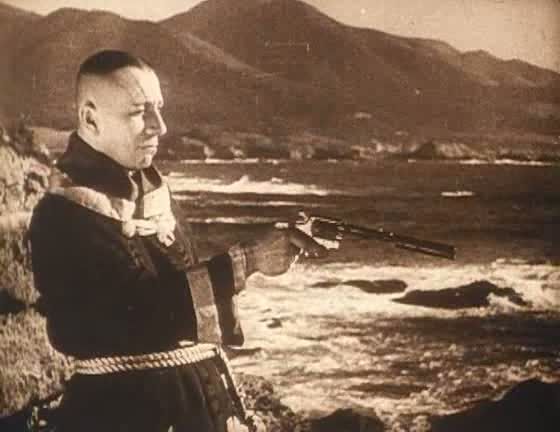
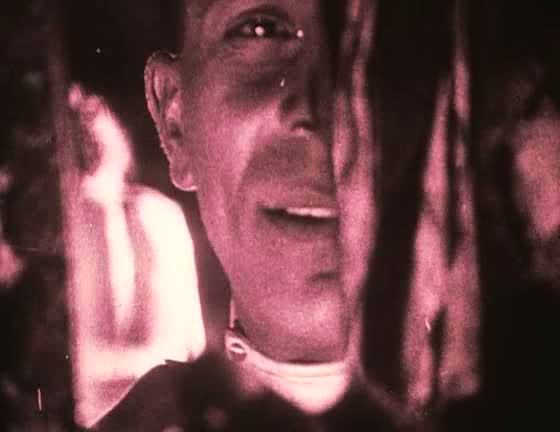
Erich von Stroheim's third film, Foolish Wives is anything but a modest effort from the always grand director. A film about excess, it takes excess as its guiding principle and its entire raison d'etre. The stories about the film's production are legion, as Von Stroheim was so concerned with realistically depicting a life of privilege and luxury onscreen that he made sure the cast lived a similar life offscreen, importing real, rare and very expensive caviar and champagne instead of faking the high-class meals that appear in the film. He constructed elaborate sets of Monte Carlo gambling palaces and mansions, and filled the sets with silks and furs. And he sent the whole bill to Universal, his studio, before turning in an impossible-to-screen eight-hour film that the studio promptly hacked apart into a far shorter cut. Thus the film, even restored to its current length of nearly two and a half hours, is unavoidably compromised, chopped down from its director's expansive, overblown vision into something much more manageable, though its ambition and its potency are still very much apparent.
The film concerns a trio of con artists, the self-proclaimed Count Wladislaw Sergius Karamzin (Von Stroheim) and his cousins, or "cousins," Olga (Maude George) and Vera (Mae Busch), at least one of whom is also one of his many lovers. Karamzin and the two "princesses" live a lavish life in decadent Monte Carlo, peddling counterfeit cash and using their grand personae and the Count's infamous way with women to ingratiate themselves into high society. It's an interesting bit of self-mythologization, because the Count is such a resonant echo of the actor who plays him, the writer/director behind this story. Von Stroheim was, much like Karamzin, a pretender, a role-player who carried over his performances as sinister aristocrats into his real life, passing himself off as an Austrian general and dignitary. He entered the United States claiming to be a count, and he added the aristocratic "von" to his name soon after becoming a director, effectively transforming himself into precisely the character he plays here, a man pretending to the aristocracy, adopting the fine manners and grand style of a European noble. In one of his signature displays of egoism, he even inserts a novel called Foolish Wives into the film, supposedly written by him, and the passage that he highlights extols the virtues of good, courtly upper-class manners.
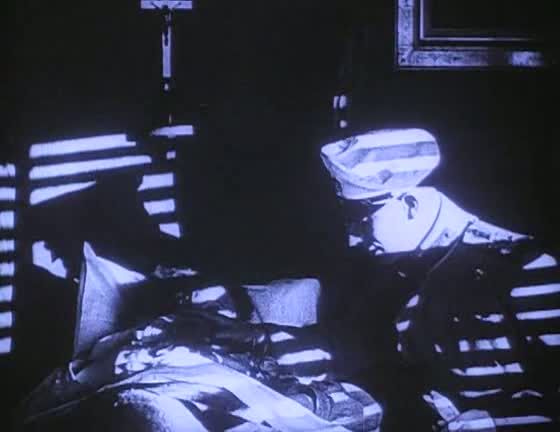
Karamzin sets his sights on Helen Hughes (Miss DuPont), the wife of the US ambassador Andrew Hughes (Rudolph Christians), though because of the film's patchwork structure, his motivations for pursuing the woman change without warning several times. His seduction of her is most ravishingly realized in the central sequence set during a violent rainstorm, in which Karamzin and Helen are trapped out in the rain during a walk. This is all part of his plan, though, allowing him to sweep her sodden body up in his arms, carrying her past sparks of lightning and rowing her across a lake in a small boat to the dilapidated cabin of a wizened hag (Louise Emmons). In one fantastic shot, Karamzin uses a hand mirror to spy on Helen as she undresses, her bare back glimpsed in the corner of the mirror as he leers in the foreground.
There's a real sensuality to this film, which seems to link sexuality to the decadent, expensive lifestyle of the main characters. Even as Karamzin seduces Helen, he also desires the mentally handicapped daughter (Malvina Polo) of the counterfeiter (Cesare Gravina) who keeps him supplied with fake bills. In a disturbing scene that sets the tone early on, she appears hugging a doll and gaping at Karamzin's dandified manners, but her obviously slack-jawed mental capacities and girlish immaturity don't stop the lecherous count from looking her up and down with blatant lust. Later, he looms over her bed while she sleeps, slatted shadows stretched across the room, the Count's shadow hanging over the girl and cast ominously on the wall above her. While all this is going on, the Count is also romancing his maid Maruschka (Dale Fuller), in a subplot that, in the extant versions of the film, abruptly pops up towards the end and has great significance for the climax.
Von Stroheim's visual style is rapturous throughout, but especially at the frenzied climax, which abruptly becomes a suspenseful action sequence with the rapid cross-cutting that Von Stroheim presumably picked up during his time as an assistant for D.W. Griffith. His images have a hazy but iconic power: flames engulfing a cross; a woman standing on a rocky outcropping, framed against the waves crashing in the background; countless gauzy and ecstatic closeups of the film's women. Von Stroheim contrasts this visual extravagance against the comparatively straightforward and prosaically shot scenes between Helen and her husband, juxtaposing their comfortable, boring marriage against the lush, sumptuous wealth and corruption of Karamzin and his cousins. Karamzin is introduced in an especially memorable way, perched on a rock above the ocean, casually shooting at targets with a pistol as long as the cigarettes that he habitually smokes throughout the film. With his scarred forehead, his monocle, and his smug smirk, he cuts a distinctive figure, an absolutely magnetic screen presence that later in his career he'd bring to countless caricatured Teutonic villains. Here he's a more nuanced character, his exaggerated pride masking an elusive vein of insecurity that shows itself especially in the scene at the end of the film where Hughes confronts the Count, causing Karamzin to look around the room at the other officers, anxious to see what they think, anxious that he not lose face.
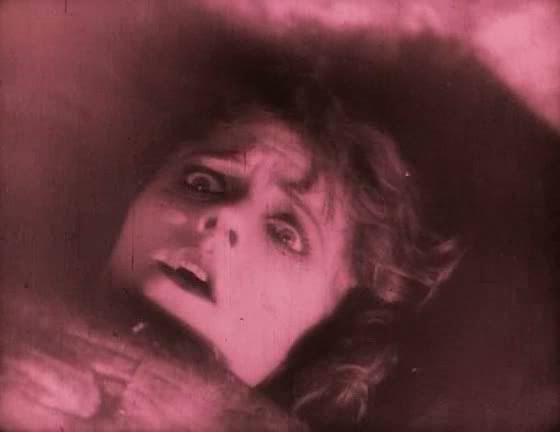
One interesting subtext in the film is the implicit comparison between Karamzin the false military officer and the real soldiers he's imitating. Early on in the film, he sees a number of soldiers passing by, and he salutes them each in turn — but pointedly fails to salute the wounded soldiers who are pushed by in wheelchairs, acting as though he doesn't even see them. Karamzin's glamorous vision of the military has little room for casualties or blood, and he seems subconsciously uncomfortable with the sight of these injured men, sporting their evidence of the real warfare that Karamzin has certainly never experienced. He projects a flashy, scrupulously clean image of military grandeur, all brass buttons and epaulets, surface rather than substance.
There's an intriguing scene where the Count looks down upon a military officer who doesn't pick up Helen's book for her, obliging the Count to do it himself while casting a disgusted glance at the other man; there is nothing that he finds more despicable than the lack of manners, the lack of surface politeness even though the surface is as deep as his own niceties extend. Later, though, the officer returns, standing outside the hotel, where Helen sees him standing with his coat at his feet. For a moment, she looks at him with the same scorn that Karamzin had, until she realizes that the man's sleeves are empty, that he's a veteran who has lost both of his arms. In one of the film's most tender and sentimental moments, she picks up his coat and wraps it around him, kissing his empty sleeve, a rare burst of sincerity and emotion in a film that otherwise revels in the cynical exploits of the manipulative Count.
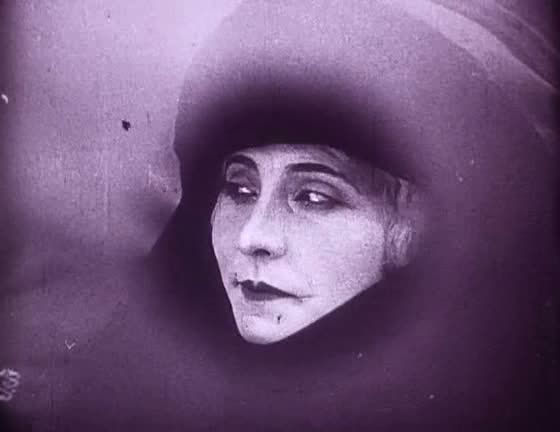
There's also some subtle dark comedy woven throughout the film, like the title cards that continually sneak bleak ideas — "suicides" and "brutality of man" — into the otherwise idyllic word collages describing Monte Carlo. At one point, Karamzin's romantic schemes are interrupted first by a goat that keeps sticking its rear in his face and then by a monk whose stern, disapproving gaze keeps the Count from making his move. Religion haunts the film in the images of crosses that are often hidden within the mise en scène, silently judging the decadent ways of these con artists.
Foolish Wives, even in the heavily edited and reconstructed version that survives, is a fascinating and engrossing film, a sharp and cynical examination of wealth and the appearance of wealth. Decadent, sexy, darkly funny and visually stunning, it's a marvelously fragmented classic.
One of the great mad follies of the silent era, Foolish Wives (what a divine title!) is the American middle-class's libido run amok.
ReplyDelete"the American middle-class's libido run amok."
ReplyDeleteTotally on target. Such a fantastically bizarre film.
Indeed the frenzied climax is perhaps the most celebrated set piece, but some unforgettable ones would include the encounter with the armless war veteran at the villa gates, (a point you note here) the count and the American wife in the cabin, the count wiping his lips in aristocratic disdain after kissing the ugly maid, the fire, and the count's body being tossed in the sewer. I completely agree that there is a heavy dose of cynicism, decadence and black humor in this fragmented masterpiece, one of three films Von Stroheim made during the silent era that can rightfully be included among the greatest films of all-time (GREED and THE WEDDING MARCH of course being the others)
ReplyDeleteFor those who live in the New York City area, the Film Forum will be hosting an Erich Von Stroheim Film festival in early June that will include this film and the director's other five silents with full piano accompaniment by Steve Sterner.
As always you have treated cineastes to a superb thematic and artistic analysis and appreciation of a screen classic.
You cite some great moments there, Sam, of which there are no shortage in this fine movie. It's the only von Stroheim I've seen so far, but I definitely need to get to Greed and the others sometime soon. Good news about the NYC festival, too.
ReplyDeleteNice review! Foolish Wives is probably the most accessible Erich Von Stroheim, but accessibility really wasn't his bag.
ReplyDeleteI love the grand folly that is his trademark, and Foolish Wives ranks among the favs!
Excellent review and analysis, one of the better ones I've read. Erich von Stroheim was, to put it mildly, complex. Sybil would be too banal a comparison. Stroheim created this being, this "Erich von Stroheim," as a means to survive and then advance in life, and he simply grew into it, and it continued to grow, and most (though not all) believed it for many years after his death. Think about this: Von Stroheim, an invented persona, directing an invented perverted (or maybe not) character who is a caricature of himself, (or maybe just a not-so-distant-cousin)! The mind reels.
ReplyDeleteI don't get the "Middle class libido run amok" thing. Nothing about von Stroheim or his films, including "Foolish Wives," was primarily (if even incidentally) about the middle class(not even Greed), or simple "libido" running "amok." The women (and their husbands)that his character(s) preyed upon were certainly not of what was considered the middle class of the time. His films studied what he considered the animalistic nature of humans -- "the human dog," I think, was his phrase,or close to it. It was most visible by contrast to the "dignified" exterior manner of the upper class. Yet it was this upper class that he claimed as his background, and he worked and made his films with that "background." Amazing.
Thanks, PCF. Pretty obvious that any director who routinely turned in such lengthy films wasn't thinking about accessibility at all.
ReplyDeleteGene, the twisty complications of Stroheim directing himself playing a weird version of himself are really rich indeed. And I'd say that, though Stroheim's films are set squarely in the upper class, they represent a middle-class fantasy of wealth and privilege. I can't say for sure what David meant by that phrase, but I took it in the spirit that this film presents a fantasy of sexual and economic decadence that middle-class audiences in particular would eat up because it allows them to simultaneously revel in and tut-tut the excesses of the wealthy.